How To Sync Icloud Calendar With Iphone
If your iCloud Contacts, Calendars or Reminders aren't syncing
Find out what to do if you need help. For example, find out what to do if the changes you've made on one device haven't appeared on all of your devices.
Things to check first
Check if you still need help after completing each of the steps below.
- Check the system status of iCloud Contacts, Calendars and Reminders.
- If a reminder isn't appearing on some devices, make sure you're running the latest iOS, iPadOS or macOS on each device. Upgraded reminders and shared reminders in iOS 13 or later or macOS Catalina or later aren't compatible with earlier versions of iOS or macOS. Learn more.
- Make sure the date and time settings on your iPhone, iPad, iPod touch, Mac or PC are correct.
- Make sure you're signed in to iCloud with the same Apple ID on all of your devices. Then check that you've turned on Contacts, Calendars and Reminders* in your iCloud settings.
- Check your Internet connection. Open Safari and go to www.apple.com/uk. If the page doesn't load, find out what to do.
- Check that you can access secure websites. Open Safari and go to your Apple ID account page. If the website doesn't load, contact your Internet service provider for help.
- Make sure you haven't exceeded your iCloud storage limit or the storage limits for iCloud Contacts, Calendars and Reminders.
* On a PC with Outlook 2016 or later, Reminders are called Tasks.
Try the steps for your device
If you still need help, try the below steps for your device.

iOS 13 and iPadOS or later
After each step, check your contacts, calendars or reminders.
Refresh your contacts and calendars
To refresh your contacts, open Contacts and swipe down on the list. To refresh your contact groups, tap Groups in the top left-hand corner, then swipe down on the list.
To refresh your calendars:
- Open the Calendar app.
- Tap the Calendars tab.
- Swipe down on the list to refresh your events.
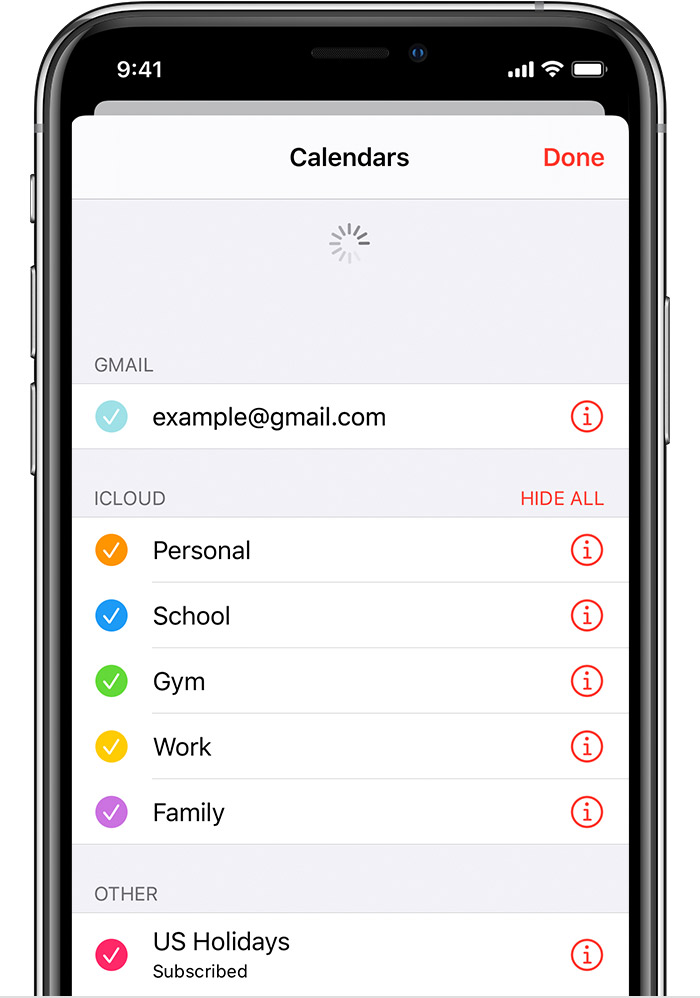
Check your app settings
- Make sure you've turned on Contacts, Calendars and Reminders on your device.
- If you use multiple groups or accounts in the Contacts or Calendars app, make sure your iCloud Contacts and Calendars are set to appear:
- Open the Contacts app and tap Groups in the top left-hand corner. Make sure All iCloud is selected.
- Open the Calendar app and tap the Calendars tab. Make sure all iCloud calendars are selected.
- Change how often your calendars update:
- Tap Settings, then Calendar.
- Tap Sync.
- If All Events is selected, choose a specific timeframe instead, such as Events 1 Month Back. If a specific timeframe is selected, choose All Events instead.
- Return to your Home screen.
- Wait a few minutes, then open the Calendar app. Tap the Calendars tab and swipe down to refresh.
Since the iCloud Birthdays calendar is updated daily, you may not see changes to birthdays in the Calendars app until the following day.
Set iCloud Contacts, Calendars or Reminders as your default
If your contacts, calendars and reminders are in iCloud, then iCloud will automatically update your information. If your information is in a third-party account, such as Google or Yahoo, you can change your default account to iCloud. Changing your default account to iCloud won't move your existing information from a third-party service to iCloud.
Contacts
To see which account your contacts are in:
- Open the Contacts app and tap Groups in the top left-hand corner.
- Untick the All [account] option for any third-party account, such as Gmail or Yahoo.
- Make sure All iCloud is selected.
- Tap Done to see your list of contacts. If you can't see the contact you're looking for, it's stored in another account.
- If you have a copy of your contacts from a third-party service in vCard format version 3.0 or later, you can import the contacts into iCloud.
Set iCloud as the default account for your contacts:
- Tap Settings, then Contacts.
- Tap Default Account.
- Select iCloud.
Calendars and Reminders
To see which account your calendars are in, open the Calendar app and then tap the Calendars tab.
Set an iCloud calendar as the default calendar:
- Tap Settings, then Calendar.
- Tap Default Calendar.
- Tap a calendar under iCloud to make it your default calendar.
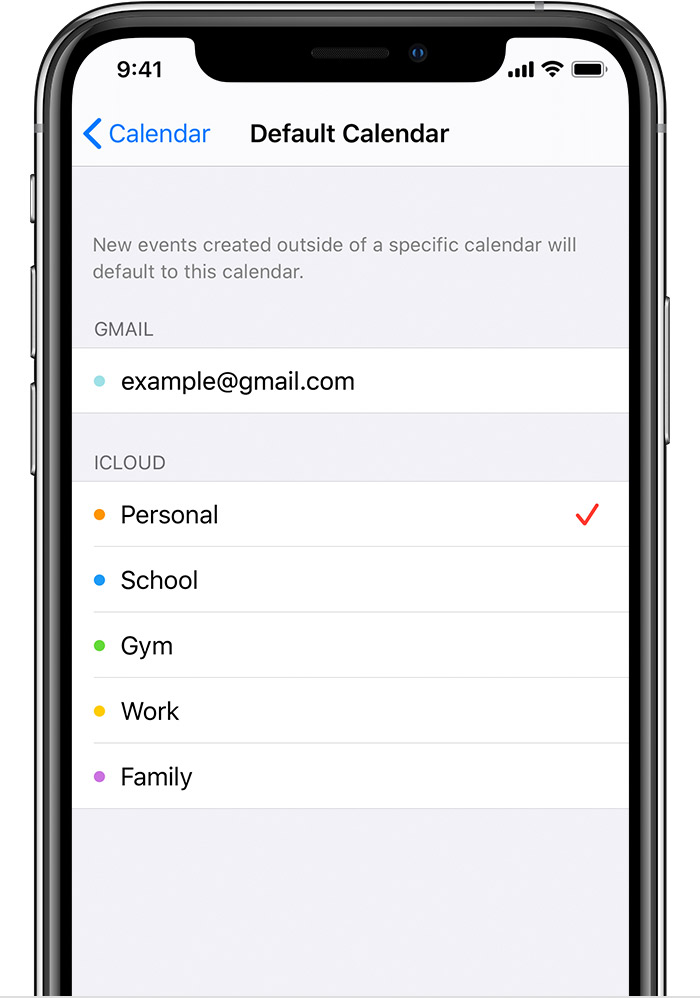
Set an iCloud reminders list as the default list:
- Tap Settings, then Reminders.
- Tap Default List.
- Tap a list under iCloud to make it your default list.
Restart the Contacts, Calendar or Reminders app
- Close the app.
- Return to your Home screen.
- Wait a minute, then open the app again.
Turn off iCloud Contacts, Calendar or Reminders, and turn it back on
- Tap Settings > [your name] > iCloud.
- Slide to turn off Contacts, Calendars and Reminders.*
- If you see your calendars or reminders on iCloud.com or any of your devices, you can choose Delete from My [device]. If not, choose Keep on My [device].
- Wait a few minutes, then turn on Contacts, Calendar or Reminders again.
* Local reminders will be deleted from your device, but your information won't be deleted from iCloud. After you've turned Reminders back on, your reminders will be re-synced to your device.
Restart your iPhone, iPad or iPod touch

iOS 12
After each step, check your contacts, calendars or reminders.
Refresh your contacts, calendars and reminders
To refresh your contacts, open Contacts and swipe down on the list. To refresh your contact groups, tap Groups in the top left-hand corner, then swipe down on the list.
To refresh your calendars and reminders:
- Open the Calendar app.
- Tap the Calendars tab.
- Swipe down on the list to refresh your events and reminders.
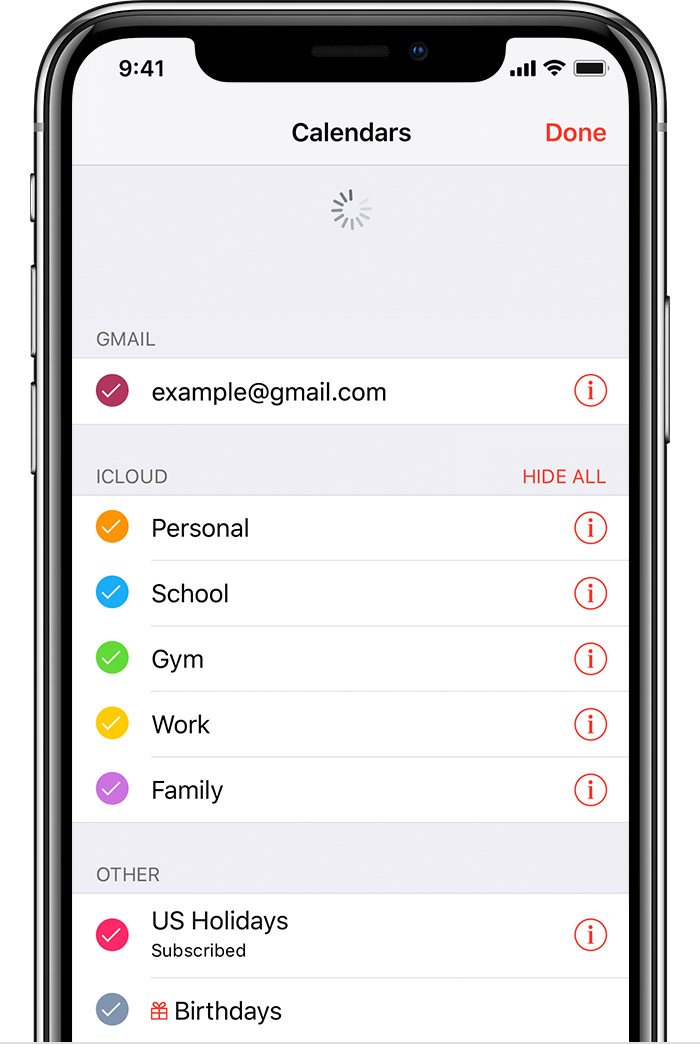
Check your app settings
- Make sure you've turned on Contacts, Calendars and Reminders on your device.
- If you use multiple groups or accounts in the Contacts or Calendars app, make sure your iCloud Contacts and Calendars are set to appear:
- Open the Contacts app and tap Groups in the top left-hand corner. Make sure All iCloud is selected.
- Open the Calendar app and tap the Calendars tab. Make sure All iCloud is selected.
- Change how often your calendars and reminders update:
- Tap Settings > Calendar, or tap Settings > Reminders.
- Tap Sync.
- If All Events or All Reminders is selected, choose a specific timeframe instead, such as Events or Reminders 1 Month Back. If a specific timeframe is selected, choose All Events or All Reminders instead.
- Press the Home button.
- Wait a few minutes. Open the Calendar app, tap the Calendars tab and swipe down to refresh.
Since the iCloud Birthdays calendar is updated daily, you may not see changes to birthdays in the Calendars app until the following day.
Set iCloud Contacts, Calendars or Reminders as your default
If your contacts, calendars and reminders are in iCloud, then iCloud will automatically update your information. See if your information is in iCloud or a third-party account, such as Google or Yahoo. Then change your default account to iCloud.
Contacts
Find out which account your contacts are in:
- Open the Contacts app and tap Groups in the top left-hand corner.
- Untick the All [account] option for any third-party account, such as Gmail or Yahoo.
- Make sure All iCloud is selected.
- Tap Done to see your list of contacts. If you can't see the contact you're looking for, it's stored in another account.
- You can import the contact from a third-party service into iCloud.
Set iCloud as the default account for your contacts:
- Tap Settings > Contacts.
- Tap Default Account.
- Select iCloud.
Calendars and Reminders
Find out which account your calendars are in:
- Open the Calendar app.
- Tap an event to open it.
- Tap the calendar name to see if the event is in an iCloud calendar.
Set an iCloud calendar as the default calendar:
- Tap Settings > Calendar.
- Tap Default Calendar.
- Tap a calendar under iCloud to make it your default calendar.
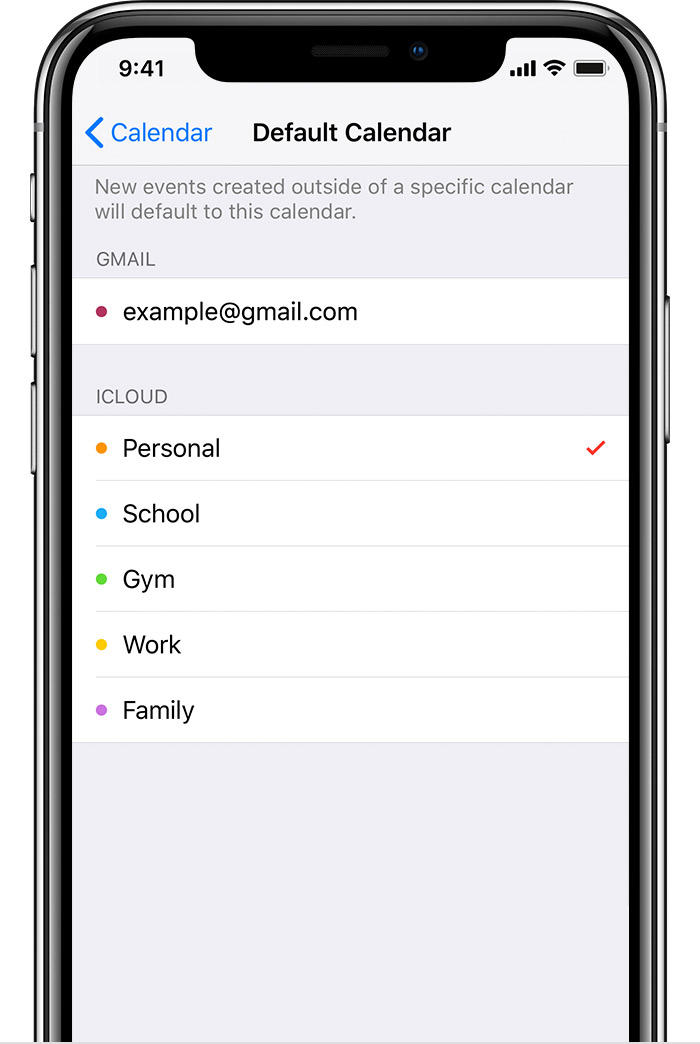
Find out which account your reminders are in:
- Open the Reminders app.
- Tap the list name in the top left-hand corner to view all of your lists.
- Find out if the list is stored on your device or iCloud. Open a list and tap Edit. If you can see Sharing, then your list is in iCloud.
When you create a reminder, you can choose to store it in iCloud or on your iOS device.
Restart the Contacts, Calendar or Reminders app
- Double-click the Home button to see your open apps.
- Find the app, then swipe up to close it.
- Press the Home button to return to your Home screen.
- Wait a minute, then open the app again.
Turn off iCloud Contacts, Calendar or Reminders, and turn it back on
- Tap Settings > [your name] > iCloud.
- Slide to turn off Contacts, Calendars and Reminders.*
- If you see your calendars or reminders on iCloud.com or any of your devices, you can choose Delete from My [device]. If not, choose Keep on My [device].
- Wait a few minutes, then turn on Contacts, Calendar or Reminders again.
* Local reminders will be deleted from your device, but your information won't be deleted from iCloud. After you've turned Reminders back on, your reminders will be re-synced to your device.
Restart your iPhone, iPad or iPod touch

Force sync Calendar data on Apple Watch
To force sync Calendar data on your Apple Watch:
- Open the Watch app on your iPhone and tap the My Watch tab.
- Tap General, then tap Reset.
- Tap Reset Sync Data.
If a family member set up your Apple Watch for you, you can't force sync Calendar data.

macOS
After each step, check your contacts, calendars or reminders.
Refresh your calendars and reminders
You can refresh your calendars from the Calendars app:
- Open the Calendar app.
- Choose View.
- Refresh Calendars.
Since the iCloud Birthdays calendar is updated hourly, you may not see changes to birthdays in the Contacts or Calendars app for an hour.
To refresh your reminders, quit the Reminders app and then open it again.
Check your default Calendar, Reminders and Contacts account
If you store and edit your events in iCloud instead of another place, such as On My Mac, Exchange or Google, then iCloud will automatically update your calendars. If you use multiple accounts on your Mac, such as iCloud, Gmail and Yahoo, make sure iCloud is your default Calendar account:
- Open the Calendar app.
- Choose Calendar > Preferences.
- In the General tab, make sure one of your iCloud calendars is the default.
If you store and edit your contacts in iCloud instead of another place, such as On My Mac, Exchange or Google, then iCloud will automatically update your contacts. If you use multiple accounts on your Mac, such as iCloud, Gmail and Yahoo, make sure iCloud is your default Contacts account:
- Open the Contacts app.
- Choose Contacts > Accounts.
- Click the iCloud tab and make sure you're signed in with your Apple ID.
As long as you've turned on Reminders in System Preferences, you see your iCloud reminders on your Mac.
Turn off iCloud Calendar and iCloud Reminders, then turn it back on
- Quit the Calendar and Reminders apps.
- Choose Apple menu > System Preferences, click Apple ID and then click iCloud. If you're using macOS Mojave or earlier, choose Apple menu > System Preferences and then click iCloud.
- Deselect Calendars and Reminders.*
- Close System Preferences and wait about a minute.
- Choose Apple menu > System Preferences, click Apple ID and then click iCloud. If you're using macOS Mojave or earlier, choose Apple menu > System Preferences and then click iCloud.
- Select Calendars and Reminders.
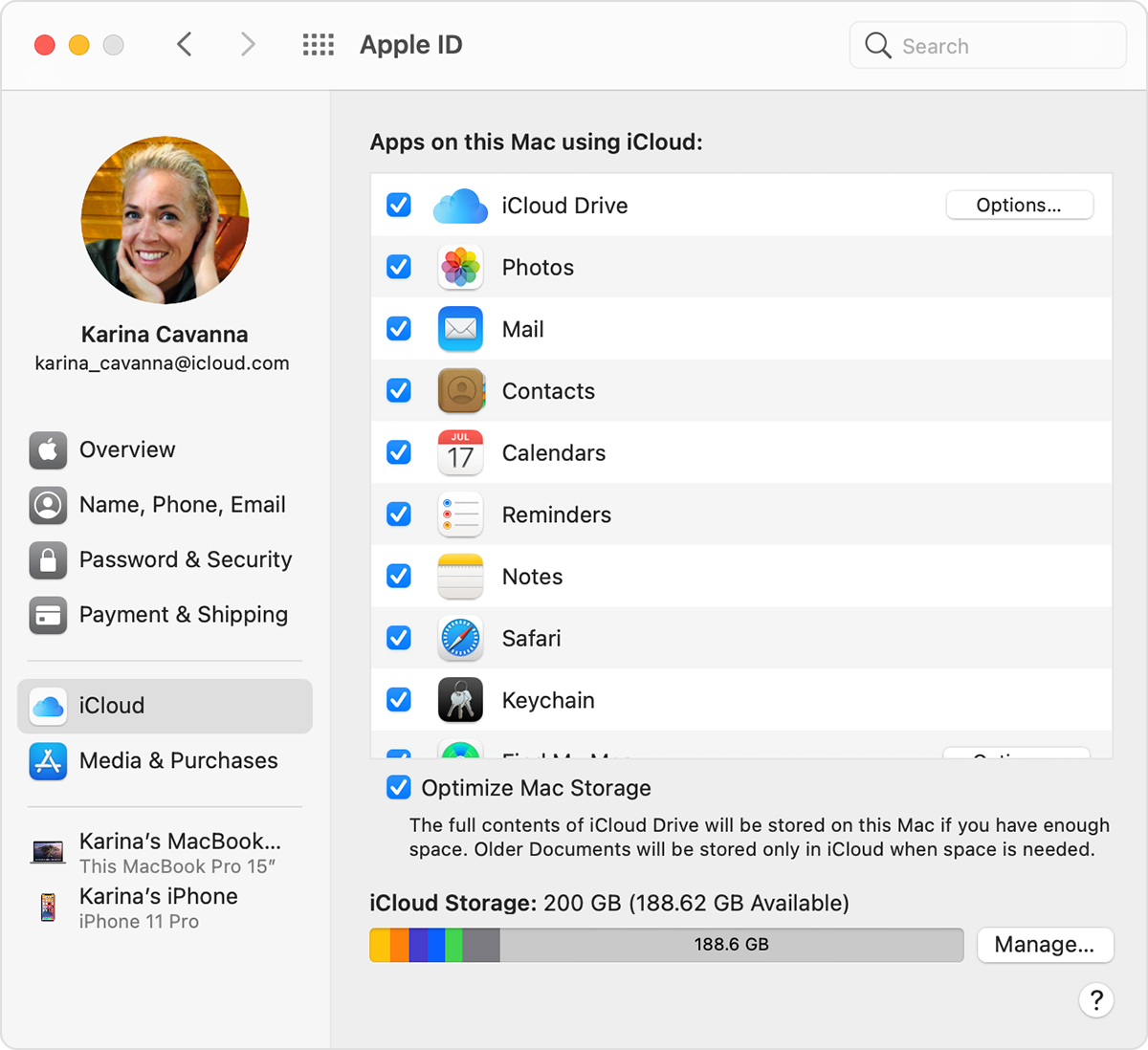
- Open Calendar and Reminders.
* Local reminders will be deleted from your device, but your information won't be deleted from iCloud. After you've turned Reminders back on, your reminders will be re-synced to your device.
Restart your computer
After you've restarted your computer, see if the issue has been fixed.

iCloud.com
If you can't see all of your updates or are experiencing a different issue, try these steps on iCloud.com:
- Update your browser and clear the cache.
- If you can't see updates from other devices, open another app on iCloud.com, such as Mail. Then go back to the Contacts, Calendar or Reminders app.
- Sign out of iCloud.com, then sign back in.
- Clear your browsing history. Choose History > Clear History.
Since the iCloud Birthdays calendar is updated daily, you may not see changes to birthdays in the Calendars app until the following day.
If you've received a spam iCloud Calendar request
If you've received a calendar request that you think may be spam or junk, let us know. Sign in to iCloud.com with your Apple ID and go to the Calendar app. Open the event that you want to mark as junk, click Report Junk and then click OK. We'll automatically delete the event from your Calendar on all of your devices that are signed in with the same Apple ID.
You can also go to the invitation from your iPhone, iPad, iPod touch or Mac and choose Report Junk > Delete and Report Junk.

Microsoft Windows
After each step, check your contacts, calendars or reminders.
Reminders are called Tasks in iCloud for Windows.
Refresh Outlook
Click Refresh![]() in Outlook.
in Outlook.
Turn off iCloud Contacts, Calendar and Tasks, and then turn it back on
- Open iCloud for Windows.
- Deselect Mail, Contacts, Calendars and Tasks, and then click Apply.
- Wait a few seconds, select Mail, Contacts, Calendars and Tasks, and then click Apply.
- Open Outlook.
Make sure the iCloud Outlook Add-in is active
In Outlook 2010 and later:
- Click the File menu.
- Click Options in the left-hand panel.
- Click Add-Ins in the left-hand panel of the Outlook Options window.
- Look at the list of add-ins in the Active Application Add-Ins section.
- Select the iCloud Outlook Add-in.
Find out how to manage Add-ins with Microsoft Outlook.
Check your default account in Outlook
In Outlook 2010 and later:
- Click the File menu.
- Select Info > Account Settings > Data Files.
- If iCloud is the default account in the Comments column, select a different account and click Set as Default.
Restart your computer
After you've restarted your computer, see if the issue has been fixed.

If you still need help
Information about products not manufactured by Apple, or independent websites not controlled or tested by Apple, is provided without recommendation or endorsement. Apple assumes no responsibility with regard to the selection, performance or use of third-party websites or products. Apple makes no representations regarding third-party website accuracy or reliability. Contact the vendor for additional information.
Published Date:
Thanks for your feedback.
How To Sync Icloud Calendar With Iphone
Source: https://support.apple.com/en-gb/HT203521
Posted by: owenwonscalun.blogspot.com

0 Response to "How To Sync Icloud Calendar With Iphone"
Post a Comment